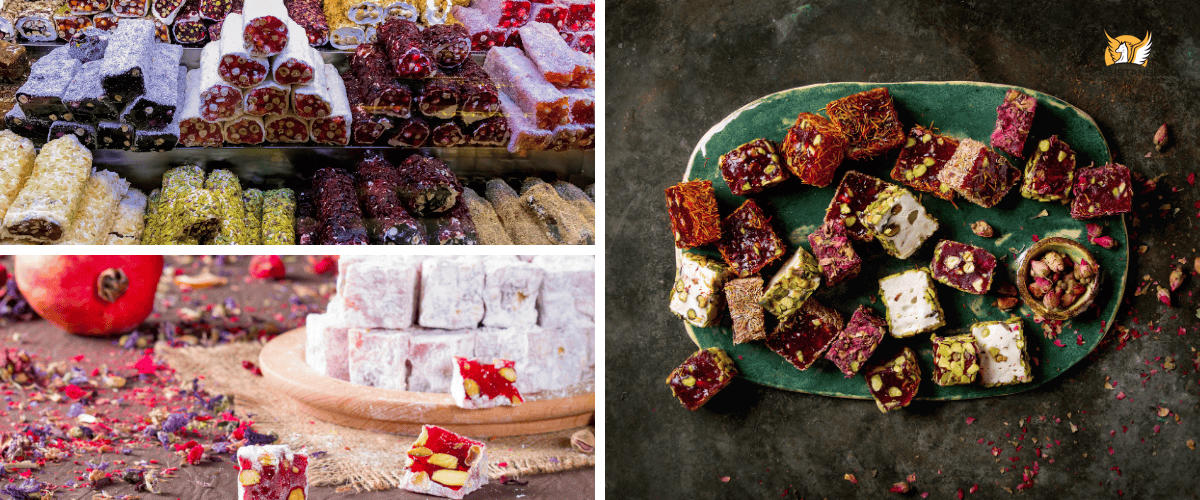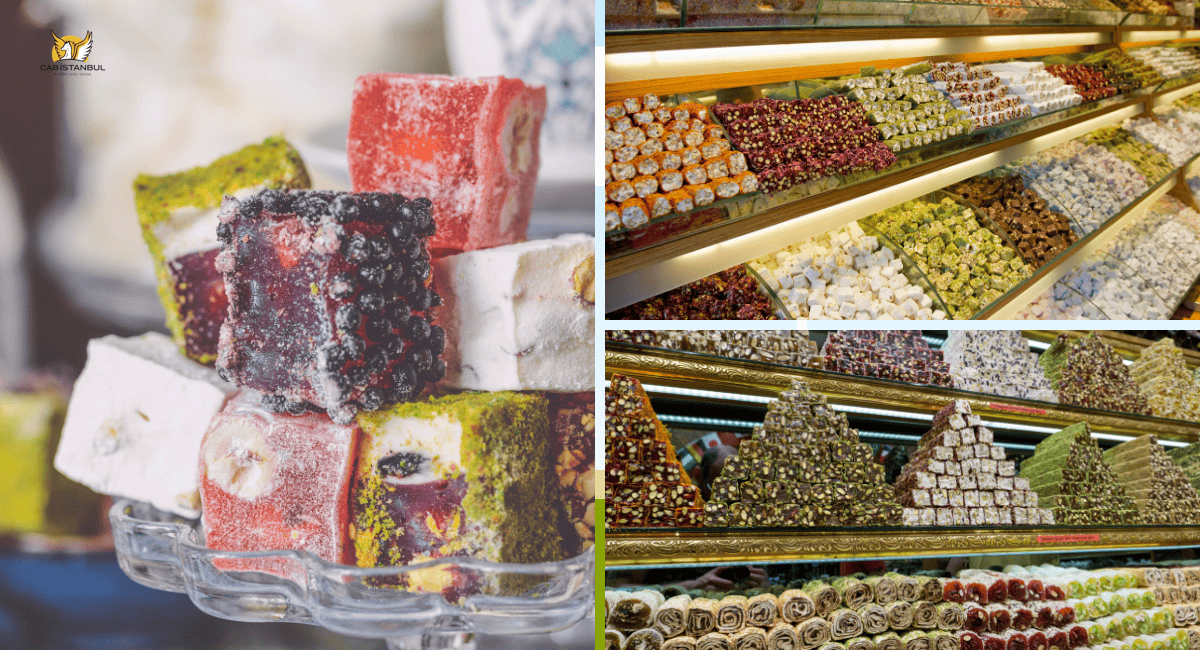Turkish Delight
2026-03-03

Lokum Turkish Delight
Lokum Turkish Delight is one of the most iconic sweets in Turkish cuisine, celebrated for its soft texture, delicate flavors, and deep cultural roots. Known as rahat-ul hulkum—meaning “comfort for the throat”—lokum dates back centuries, with its origins tied to the refined kitchens of the Ottoman Empire. From its humble beginnings in Anatolia to its refined presentation in the courts of sultans, Turkish delight has evolved into a global symbol of taste, tradition, and hospitality.
Traditionally made from a mixture of sugar, starch, and water, lokum is often infused with natural flavors such as rosewater, lemon, and orange, and enriched with ingredients like pistachios, hazelnuts, or walnuts. Its soft, chewy texture and subtle sweetness make it a perfect accompaniment to Turkish tea or coffee, and a popular gift during religious festivals, weddings, and family gatherings.
Over time, the variety of lokum flavors has expanded to include chocolate covered Turkish delight, fruit-flavored delights, and saffron Turkish delight, reflecting both regional diversity and culinary innovation. The most famous producers—such as Haci Bekir, Hafiz Mustafa, and Koska—have turned lokum into an internationally recognized delicacy, now enjoyed from Istanbul to London, from New York to Tokyo.
Beyond being a confectionery, lokum Turkish delight is also a part of storytelling and culture. Featured in books like The Chronicles of Narnia, it has gained mythic status in the West, symbolizing temptation and exotic allure.
Whether you are discovering Turkish delight in Istanbul’s historic bazaars or shopping online for authentic handmade lokum, this legendary sweet offers a timeless experience that blends flavor with heritage.
Kickstart your Istanbul voyage without the immediate need for a chauffeured car. Our proficient Istanbul airport transfer service aims to dissolve any city stress, offering round-trip flights connectivity to key airports and regional areas. With Cab Istanbul, transition stylishly and comfortably from the airport to your vital business meet, city center, hotel, or home, setting a serene outset for your Turkish adventure
Making Turkish Delight
Making Turkish Delight
Turkish Delight, or lokum, is one of Turkey’s most iconic confections—a soft, chewy sweet born from a delicate balance of sugar, water, and starch, cooked slowly until it achieves its signature gel-like texture. Unlike most Western candies, Turkish delight contains no gelatin, making it a naturally vegetarian-friendly dessert. Its smooth mouthfeel and refined sweetness set it apart, winning hearts across generations.
The charm of lokum lies in its vast range of flavors. Whether infused with rosewater, lemon, orange blossom, or the uniquely aromatic mastic, or packed with pistachios, hazelnuts, or walnuts, each bite tells a regional story. Once prepared, the mixture is poured into trays, allowed to set, and then cut into soft cubes, generously dusted with powdered sugar or coconut flakes to prevent sticking.
Crafting Turkish delight is more than just cooking—it's a centuries-old tradition, passed from master to apprentice in confectioneries across the country. The process begins by dissolving sugar in water, then gradually blending it with a prepared mix of starch and often citric acid or tartaric acid to stabilize the consistency. As the mixture thickens and becomes glossy, it's flavored and enriched with nuts or fruit syrups, then tested for the ideal stickiness.
The final creation is then shaped, cooled, cut, and elegantly packed—each piece a symbol of Turkish hospitality and craftsmanship. From Istanbul’s historic bazaars to modern gourmet shops, lokum remains a beloved souvenir and a sweet link to Anatolia’s rich culinary heritage.
Turkish Delight Recipe
| Component | Ingredients |
|---|---|
| Base Syrup | 4 cups granulated sugar 1½ cups water 1 tsp lemon juice or ½ tsp citric acid |
| Starch Gel | 1 cup cornstarch 2½ cups cold water ½ tsp cream of tartar (optional) |
| Flavor Options | (Choose one or combine) – 1 tbsp rosewater – Zest of 1 lemon or orange – ½ tsp mastic powder – 1 tsp orange blossom water – 1 tsp vanilla extract |
| Nut Options | (Optional) ½–1 cup chopped pistachios, walnuts, or hazelnuts |
| Coating Mixture | ½ cup powdered sugar 2 tbsp cornstarch |
Yield ~30–40 pieces/ Preparation Time 20 minutes/Cooking Time 60 minutes/ Resting Time 6–8 hours at room temperature
– Always stir continuously to avoid lumps.
– Use a candy thermometer if available.
– Fresh nuts give better taste. Store in an airtight container
at room temperature for up to 2 weeks. Avoid humidity.
Flavoured Turkish Delight
Turkish Delight, with its versatile nature, unfolds in a spectrum of flavors and forms. From the floral essence of rose delight to the nutty allure of hazelnut, walnut, and pistachio delights, the spectrum extends to fruity, creamy, minty, and even chocolatey domains. Each variant, whether it’s the double-roasted delight or the whimsical marshmallow delight, narrates a unique flavor story, embodying the rich and diverse Turkish confectionery tradition.
Venture into Istanbul, the heart where Turkish Delight beats strong, and let your taste buds dance to the sweet melody of Lokum, a melody that has resonated through centuries and across continents, sweetening the world one cube at a time.
Turkish Delight Candy
Turkish Delight Classic & Flavored Varieties
Plain (Sade) Delight: The simplest form made from sugar, starch, and water. Often coated with powdered sugar.
Rose Delight: Flavored with rosewater, giving it a floral aroma and pink color. One of the most iconic varieties.
Lemon Delight: Infused with natural lemon juice or zest, offering a citrusy, refreshing taste.
Orange Blossom Delight: Scented with orange blossom water, popular in the Mediterranean region.
Mastic Delight: Flavored with mastic resin, creating a chewy texture and subtle herbal flavor, popular in western Turkey.
Mint Delight: A cool, refreshing flavor, often in green and served in summer.
Pistachio Delight: One of the most luxurious, filled with Antep pistachios for a rich crunch.
Walnut Delight: Earthy and slightly bitter, walnuts pair well with classic or rose flavors.
Hazelnut Delight: Popular in the Black Sea region, hazelnuts add a buttery bite.
Almond Delight: Often found in gift boxes, has a firm bite and subtle flavor.
Chocolate-Covered Delight: A modern take, Turkish delight coated in dark or milk chocolate. Sometimes with nuts inside.
Coconut-Coated Delight: Cubes are rolled in desiccated coconut instead of powdered sugar. Often used with fruit flavors.
Double Roasted Delight: (Çifte Kavrulmuş) Typically with pistachios or hazelnuts, giving a firmer texture and toasted aroma.
Saffron Delight: Infused with real saffron, giving a yellow hue and unique aroma. Common in Safranbolu.
Mixed Fruit Delight: Includes flavors like strawberry, pomegranate, cherry, apple, etc., often colored naturally.
Bird Delight: (Kuş Lokumu) Mini, bite-sized versions served with Turkish coffee. Usually plain or rose-flavored.
Ayva (Quince) Delight: Made with quince puree, known for its soft texture and subtle tartness.
Kaymaklı Delight: Filled with clotted cream (kaymak) — soft and creamy inside, best kept fresh.
Serving Lokum the Turkish Way: The traditional tableau of serving Lokum often sees it alongside a cup of rich Turkish coffee, although its presentation is subject to one's preference. This pairing isn't just about taste; it's a cultural emblem, portraying a long-standing tradition that has seamlessly transitioned through time, continuing to be a cherished practice.
A Gentle Caution: While Lokum is a natural and healthful treat, moderation is key. Its composition of carbohydrates, starches, and sugars can, when consumed excessively, challenge the body's digestive efficiency, potentially leading to fat accumulation in the liver and consequent weight gain.
Lokum's Cultural Imprint and Modern-day Offerings: Turkish Delight, a customary offering on special occasions, shares a harmonious relationship with Turkish Coffee, marking a significant spot in the cultural heart of Turkey. This sweet tradition has transcended through time, with contemporary confectioners offering an eclectic array of Lokum varieties. The quest for the finest Turkish Delight might lead you to various esteemed producers, each holding their unique recipes close, yet sharing the common aim of preserving this sweet legacy.
Traditional Turkish Delight
Best Turkish Delight
Indulging in Turkish Delight, or Lokum, is not merely a sweet encounter, but a voyage through time and tradition. Across the bustling bazaars and quaint boutiques of Turkey, a handful of iconic brands have been cherishing and upholding the sweet legacy of Lokum for centuries. Here's a glimpse into the illustrious houses of Turkish Delight that continue to sweeten the world with their timeless confections.
Ali Muhiddin Haci Bekir Delight
Since 1777, Ali Muhiddin Haci Bekir has been a confectionery cornerstone, handcrafting Lokum for over four centuries. Nestled in Pendik, this heritage brand offers a spectrum of Turkish Delight varieties, including a unique Turkish coffee flavor, each creation narrating tales of sweet traditions.
Hafiz Mustafa Turkish Delight
A haven for Lokum aficionados since 1864, Hafiz Mustafa in Sirkeci carefully crafts Turkish Delight that has become a sought-after treasure. Among its prized offerings, the double roasted Turkish Delight stands as a must-try for anyone venturing into this sweet realm.
Şekerci Cafer Erol
With a sweet saga dating back to the Ottoman era, Şekerci Cafer Erol has been a Lokum sanctuary since 1945. Located in Kadıköy, it hosts nearly 50 types of Turkish Delight, with the pistachio variant being a delightful crowd-pleaser.
Cemilzade 1883
Rooted in four generations of Lokum craftsmanship since 1883, Cemilzade 1883 in Kadıköy prides itself on preserving a unique recipe. The boutique offers an array of Lokum varieties, each a testimony to an unaltered sweet heritage.
Divan Bakeries
Known globally with its 16 boutique stores, Divan is a maestro of handmade gourmet delicacies. Beyond borders, it carries the sweet tradition of Turkish Delight, offering a diverse and natural selection to sweet-toothed aficionados.
Safranbolu Turkish Delight
This brand embodies a specific Lokum variant that has gracefully transitioned through time, originating from Safranbolu. Crafted with a blend of sugar, water, starch, citric acid, and additional ingredients, Safranbolu Turkish Delight is recognized for its bright cut surface, non-sticky and elastic texture, offering a delightful mouthfeel devoid of raw starch taste. Its geographical indication registered by the Turkish Patent and Trademark Office accentuates its authentic and historical essence.
Pistachio Turkish Delight


Write a Comment !